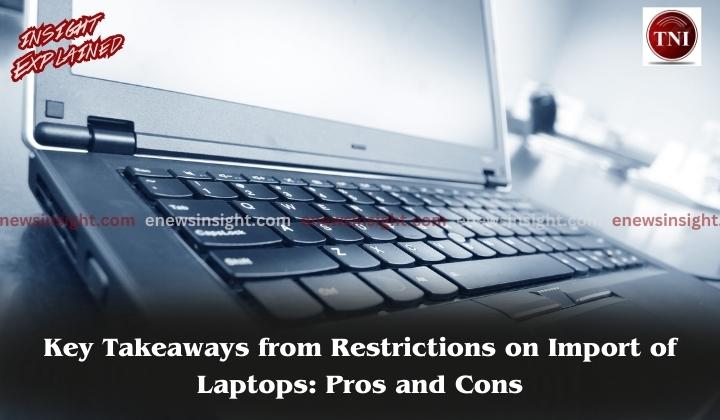Key Takeaways from Restrictions on Import of Laptops: Pros and Cons
Indian Government Implements Import Restrictions on Electronic Gadgets, Requires Licenses for Inbound Shipments under HSN Code 8471.
New Delhi, TNI Bureau: On Thursday, the Indian central government implemented restrictions on the import of laptops, tablets, all-in-one personal computers, and ultra-small computers and servers. The Directorate General of Foreign Trade (DGFT) issued a notification under HSN Code 8471, requiring entities or companies planning to import these electronic gadgets for sale in India to obtain permission or a license from the government for their inbound shipments.
Reasons for Imposing Restrictions:
The primary objective of these restrictions is to promote domestic manufacturing of laptops and computers under the renewed production-linked incentive (PLI) scheme for IT hardware. By encouraging local production, the government aims to reduce dependency on imports from countries like China and Korea. Another crucial aspect behind these measures is to safeguard the security of citizens. The government expressed concerns that certain hardware may pose security risks and compromise sensitive data.
Exemptions and Transition Provisions:
Certain exemptions have been provided under the foreign trade policy (FTP). Import consignments with bills of lading and letters of credit issued before August 3 can be imported without requiring a license. Regular importers can apply for a license from August 4 onwards. Additionally, there are exemptions for the import of one laptop, tablet, all-in-one personal computer, or ultra-small form factor computer purchased from e-commerce portals through post or courier, subject to payment of applicable duty.
Also Read: PM Modi to lay foundation stone for redevelopment of 508 Railway Stations on Sunday
Support Independent Journalism? Keep us live.
For research and development, testing, benchmarking, evaluation, repair and return, and product development purposes, importers can avail exemptions for up to 20 items per consignment. Imports under baggage rules are also not subject to the restrictions.
Potential Impact of the Move:
The announcement had an immediate impact on the stock market, with shares of local electronics contract manufacturers surging. Major companies, including Apple and other PC manufacturers like Lenovo, HP, Asus, Acer, and Samsung, may face significant changes in their operations. They will need to either start manufacturing their laptops in India or halt imports, which could potentially lead to an increase in the prices of current laptops, computers, MacBooks, and Mac Minis in the Indian market.
Also Read: Odisha Government Appoints Subroto Bagchi as Chief Advisor for Institutional Capacity Building
However, the extent of the impact will become clearer in the coming days. At present, existing laptops in the Indian market have not seen price changes, but future sales and discounts offered by retailers and companies may be affected. With the government’s push for local manufacturing, there is a possibility of reduced prices for these gadgets in the long run.
Conclusion:
The new restrictions on the import of laptops and computers are driven by a dual purpose – promoting domestic manufacturing and ensuring the security of citizens’ data. While this move may have positive implications for the growth of the Indian electronics industry, it may also lead to short-term price hikes and potential challenges for international tech giants. The effectiveness of these restrictions will depend on how companies adapt to the changing import landscape and whether local production can meet the demand for these popular electronic gadgets.


Comments are closed.